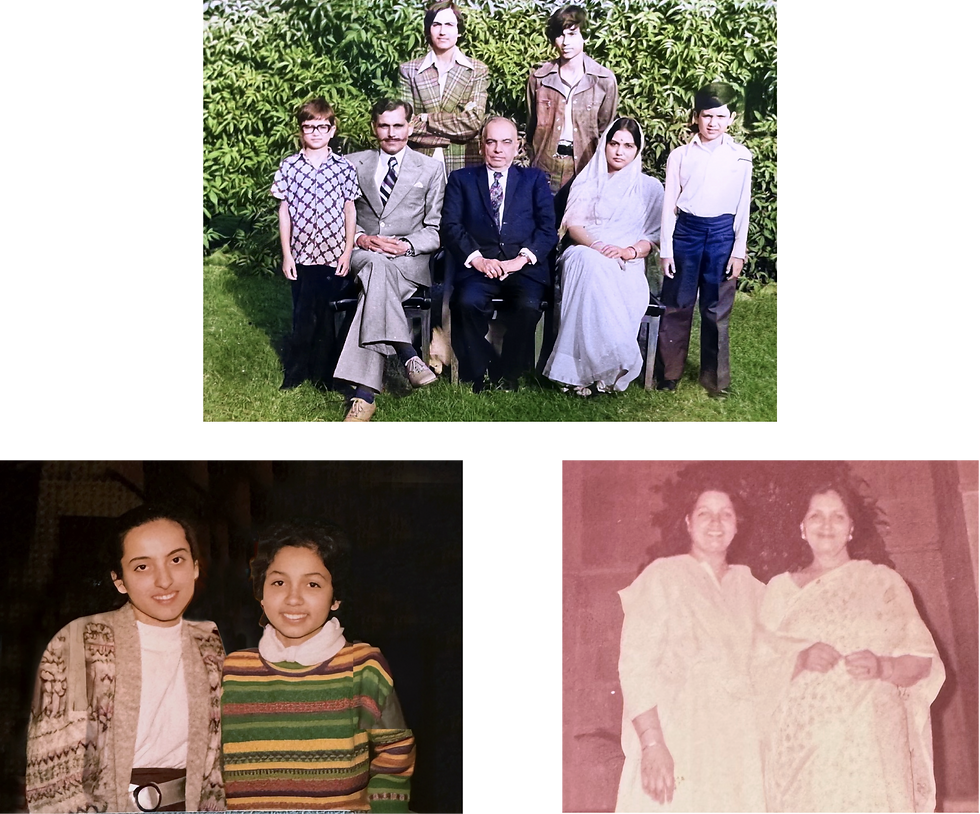Bijnori Babus
- rajatmeresh

- May 1, 2025
- 5 min read
Updated: Sep 16, 2025
We called it our hometown
But it wasn't where we were raised
Growing up, Bijnor was where we ‘holidayed’
Though most other destinations would win hands down

We didn’t make the trip for Bijnor’s scenic beauty
And there wasn’t much for us to do
Except, Amma happily made or sent for Laddoos
While Babuji was impressed by our English and beamed at us proudly

They were our paternal grandparents
Besides being good folks and Brahmins, they didn’t really have much in common
Yet there was respect between them, that was certain
Their relationship wasn’t a case of opposites attract – they’d been married in their teens
by arrangement

For a long while, they lived in a large joint family
Born in nearby Khari in 1910, Babuji had four older sisters and two brothers and by 1952,
six kids and a grandson – you know those days
He’d lost both parents when he was just a boy, and years later his older brother, so in important matters he lead the way
His Zamindar lineage enabled him to look after his brothers’ families too, but with his immediate kin, he moved out from the massive Haveli they later called Purana Ghar, eventually

In 1966, the sprawling home he built in the heart of mofussil Bijnor was ready
Three storeys high, two gates, front lawn, Aangan, terraces and a backyard that also housed cows and buffaloes, so all could be offered a fresh beverage
Babuji would smile broadly, thinking we’d be delighted with the Doodh, but as he was Dad’s Dad, we could hardly express outrage
From the terrace, we’d pluck guavas off the treetop and mangoes arrived from the farm,
while what often vanished was the water and electricity

There was no generator for years but hand fans and a hand pump – we had to lug buckets up a steep flight of stairs so it was a project to go to the loo
On our trips, we didn’t wonder why the house didn’t have an elevator, but what architect puts toilets between the kitchen and dining room?
One of our earliest visits was for my aunt’s wedding – she had knit beautiful sweaters for us
when we were little – I asked folks where her children were since there was already a groom
As kids we enjoyed the house’s nooks and crannies, and playing hide-n-seek because to entertain ourselves, what was there to do?

Somehow, we didn’t play much chess in Bijnor though Babuji, having won a few tournaments, introduced us to the game
He was also into bridge and for some years, a regular at the Bijnor Club where he played and mingled with judges, lawyers, others
But not all people were let into the house, just till the porch or sit-out, where Babuji reclined
in a chair with armrests long enough for legs, and met his visitors
Perhaps because some were dacoits and killers – Babuji was a criminal defense lawyer
of some acclaim

He had clearly gotten on with life – when he was a preschooler, a dacoit’s bullet had killed his mother when she tried to protect her daughter
And a few years later, he lost his father – it must have been tough but his older brother by five years, Bade Babuji, encouraged him to pursue his studies
Despite the tragedies, Babuji was a good student and later, also learnt to manage his career, farm and extended family
Bade Babuji was the head of the family first, but shockingly in 1946, passed away
in a train disaster

Babuji was a Revenue Officer, about to be posted as Commissioner, but he declined and began practicing law as he was now responsible for the family and farms near Bijnor – by then he had three kids with Amma, three other babies didn’t survive, and three more were to follow
Amma was born in Jaipur in 1915 but grew up in Sewar, where she was home-schooled and also trained by a Brit lady to knit, crochet and stitch
She was interested in and learnt the scriptures and though her main language was Hindi,
she picked up a smattering of English
She was married at 13, lost her mother soon after in the throes of childbirth, went to live in Bijnor at 15, and was a mother herself at 17 or a few months before

To us, Amma was a kind old lady who lovingly put her hand over our heads and gave us Prasad after her hours-long Puja, which she never missed
Before their Puja though, she and my indoctrinated aunts, would bathe and not touch anyone or anything, while they were busy with their Gods
Mostly, we couldn't step into the Mandir, where they worshipped idols of Shrinathji and other deities – their daily ritual was pretty over the top
Boys or menstruating or unbathed ladies weren’t allowed into the kitchen either, unless you wanted to hear Amma or Mishraniji (our Brahmin cook) hiss

While Bijnor wasn’t and isn’t a particularly clean town, their fetish for cleanliness and purity indoors, created some brouhaha
As kids, we were somewhat amused and mystified but followed the home’s unspoken rules
as best we could
Not all the grownups got it either – crockery and glassware was strictly for outsiders and there were washing protocols too, but mostly it was all good
Dad had his own rituals, including a spotless crystal glass for his evening whisky, with the English news or over Shers – enjoyed with Babuji, Phupha and Chacha

Babuji did his own thing too – once before bathing, he walked out of the loo to take a call
and so later, unbeknownst to him, my aunts bathed the phone
And long ago, when an older bro peed from the terrace upstairs into the open Aangan below,
it was collected by another bro into his steel tumbler
Of course, the steel utensil couldn’t merely be washed – speaking of which, a non-brahmin maid did the dishes in the Aangan alcove but she couldn’t touch them right after
The bros were little boys, but all hell broke loose and it’s unclear who handled the offensive tumbler and in what remote corner of Bijnor it was thrown

There was definitely some casteism – one had to be a brahmin to cook for us but not to feed, care for, milk the cows and buffaloes regularly
The chap who happily tended to the animals could also be sent off on farm work or to buy groceries, thrice a day, sometimes
Amma or my Buas would drop the requisite money into his hands from about two feet above his, so catching it was another skill the poor guy had to refine
They probably held their breath too, since a pungent mix of bovine excreta was his signature scent, and it often wafted all the way from the gate to the balcony

Looking back, Amma was very devout and single-minded about her routine, prayers, aarti
Oppressive summer or winter, electricity or no electricity, water in the taps or not, she would go about her day quietly
This included feeding the men and kids first, done with the help of Mishraniji and her Bahus who covered their heads with their Pallus, Mom and Chachi
Every day, they made innumerable trips from the kitchen to the dining room with hot food and Rotis, enough to feed an army

Unlike Babuji, Amma had no interest in chess or bridge or even Chitrahar, usually mass PT set to music, which the family watched on a b&w television
That was our entertainment though sometimes, we’d be taken for a movie – once the audience loved it and almost throughout, chucked coins at the screen
Occasionally, there was singing and Dad, Chacha and our Buas could certainly carry a tune – Bijnor probably didn't have a pool because when I mentioned swimming, Babuji took us to the farm where tubewell water gushed into a tiny pond, but at least the place was green
Babuji typically gave his best whether it was Mithai, Urdu poetry, bridge or chess – he was brilliant but laid back, sometimes literally, when his Munshi would arrive to wake him for court
which was already in session.




